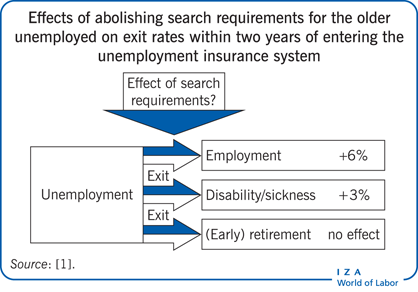Elevator pitch
Many OECD countries have, or have had, a policy that exempts older unemployed people from the requirement to search for a job. An aging population and low participation by older workers in the labor market increasingly place public finances under strain, and spur calls for policy measures that activate labor force participation by older workers. Introducing job search requirements for the older unemployed aims to increase their re-employment rates. Abolishing the exemption from job search requirements for these workers has been shown to initiate higher outflow rates from unemployment for the older unemployed.
Key findings
Pros
There is evidence that introducing job search requirements for older unemployed people in the Netherlands increases their outflow rate into jobs.
The financial strain imposed by older workers on the unemployment insurance system is reduced if older workers are re-employed sooner.
Evidence for Germany shows that older unemployed workers receive higher reservation wages if they are exempted from job search requirements, indicating that there is a reduced incentive to accept jobs.
Monitoring and sanctioning stimulate the unemployed to meet their search requirements.
Cons
Evidence for the Netherlands shows that a side effect of reintroducing job search requirements for the older unemployed is inflow into sickness and disability insurance schemes.
Monitoring and screening the search efforts of older workers entails implementation costs.
For older workers with a skill mismatch and long unemployment spells, job search effectiveness can be limited.
Re-employment problems of older workers due to restrictions from the demand side of the labor market cannot be solved by search requirements.
